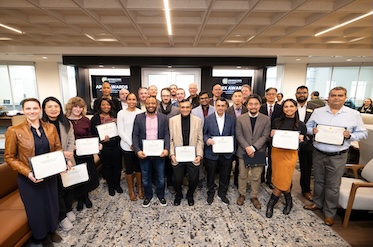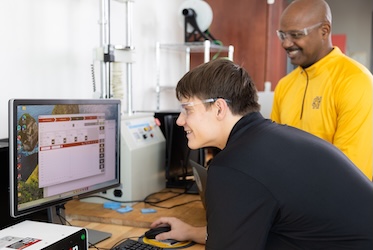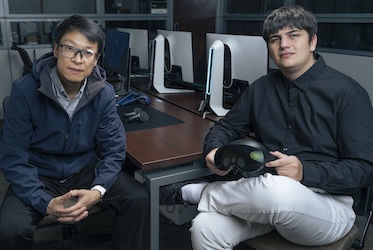

KENNESAW, Ga. | Jul 17, 2019
Office of Research manages sustainable farm renamed KSU Field Station
Nestled along a tree-lined road parallel to Interstate 75 spans 25 acres that Kennesaw
State University has operated as a sustainable farm since 2013. The Office of Research began managing the site July 1, which was renamed the Kennesaw State University Field Station.
Phaedra Corso, vice president for research, explained that the site represents a boost
in the university-wide initiative to enhance undergraduate research through expanded
experiential learning opportunities and in turn support faculty members and graduate
students, so they can explore important areas of scholarship and research that are
aligned to real-world applications.
A focus on the environment is a top priority for the Field Station due to the continued
increase in global populations. Projects tackling sustainability issues through innovative
home design or self-sufficient gardens, for example, can be addressed. The Field Station
also provides space for research in biology, ecology, geology and other relevant fields
to improve the quality of life.
“The KSU Field Station is a valuable resource with endless possibilities to study how to protect and conserve our environment through different disciplinary lenses,” Corso said. “We look forward to exploring new ways to make this Field Station a more integral and collaborative component of the KSU research experience for faculty and staff.”
Currently, the site supports a plethora of activities that focus on best practices
in sustainable agriculture, especially in an urban setting where locally produced,
highly nutritional food is not considered the norm, due to the lack of arable land
for conventional growing methods.
“A lot of the technology being developed now is about bringing food closer to the source as many metro areas are experiencing food deserts, and more and more people are interested in knowing where their food comes from,” said Michael Blackwell, operations manager for the KSU Field Station.
That is one of the reasons why Blackwell has implemented low-cost, energy-efficient technology-based approaches for high-yield crop production in support of KSU’s Farm-to-Campus program that was launched almost a decade ago. Historically, the KSU Field Station has been used to grow up to 20,000 pounds of produce such as lettuce annually for the Commons dining hall at KSU.
“We recently hosted the AgLanta conference here as one of the featured programs, and most academics chose us to see what a university is doing in sustainable food practices,” said Blackwell. “Overall, the visitors said that this was the best tour they had been to, which is great because we showed them some of the more innovative things we are developing.”
For example, Blackwell built a 10-by-10-foot walk-in cooler with advanced construction techniques to refrigerate produce after being harvested. The cooler, built with repurposed wood from other projects, includes a window air conditioner controlled by a single-board computer called a Raspberry Pi to maintain optimal temperature – all under $500. He said a commercial model may cost between $10,000 to $15,000 or higher.
Another point of interest is an automated mushroom production prototype that KSU researchers Chris Cornelison and Kyle Gabriel designed and built in a shipping container on the property. This customized enclosed environment optimizes high growth yields and varieties of wildly foraged mushrooms from the field station’s forest as well as commercially produced mushrooms.
Cornelison said that having the field station will help leverage KSU in seeking external
research funding sources such as the U.S. Department of Agriculture, which has a track
record in providing significant research dollars to universities for generating solutions
in food production and food security issues.
“We are very fortunate to have the KSU Field Station because it is a real asset to the Georgia economy, which is primarily tied to agriculture,” said Cornelison. “The ability for KSU to begin becoming part of the movement for developing future agricultural approaches and the related areas of sustainability is exciting and tangible for our students to get involved with where they can see their contributions make a real difference.”
The field station also serves as a site for KSU coursework activities. One example
of student-based inquiry involved a recent four-week ecology lab taught by Paula Jackson,
professor of biology. Using an area of fallow ground, the students captured and marked
grasshoppers for recapture to learn the method of how to estimate population size
of a species in a given area.
“I think it is absolutely fantastic for us to have the field station as a resource for classes and research,” said Jackson. “I am very much interested in starting to utilize the field station moregiven its close proximity to campus and the variability and uses of the terrain that provide opportunities for a whole suite of potential research collaborations.”
Formerly called the Hickory Grove Farm, the KSU Field Station was a cement mixing
facility for Interstate 75 construction until KSU entered into a land-use agreement
with the Georgia Department of Transportation. Blackwell was originally brought onboard
as a master gardener consultant through the Pickens County extension service, when
the site was in Ball Ground for the farm-to-table program.
Now four greenhouses dot the landscape. Blackwell said that each one has its own unique
attributes to help extend the growing season year-round. The first greenhouse, called
the propagation lab, is the most important since this is where plants are reproduced
through seedlings or through tissue culture. Two others are high tunnel structures,
which feature conventional in-ground growing.
The most high-tech structure is the hydroponics lab, which utilizes a soilless growing technique in which the plants – currently lettuce and some herbs – are submerged in water inoculated with bacteria. The bacteria, acting as a biological control to decrease disease and pests, colonize the roots as they grow. They keep out the specific diseases that would normally affect the produce if grown outdoors.
“Through our work, not only are we demonstrating how to efficiently grow food in environmentally friendly ways, but we are also offering opportunities for KSU students and faculty to study the different biological and ecological systems so that we can be responsible stewards for our planet’s future,” Blackwell said.
—Joëlle Walls
Photography by Jason Getz

Kennesaw State student explores how trauma affects decision-making

Top researchers recognized for achievements at Apex Awards

Kennesaw State team innovates stronger 3D-printed structures through advanced simulations

Student, faculty researchers explore how AI can improve STEM learning through virtual reality
A leader in innovative teaching and learning, Kennesaw State University offers undergraduate, graduate, and doctoral degrees to its more than 51,000 students. Kennesaw State is a member of the University System of Georgia with 11 academic colleges. The university's vibrant campus culture, diverse population, strong global ties, and entrepreneurial spirit draw students from throughout the country and the world. Kennesaw State is a Carnegie-designated doctoral research institution (R2), placing it among an elite group of only 8 percent of U.S. colleges and universities with an R1 or R2 status. For more information, visit kennesaw.edu.